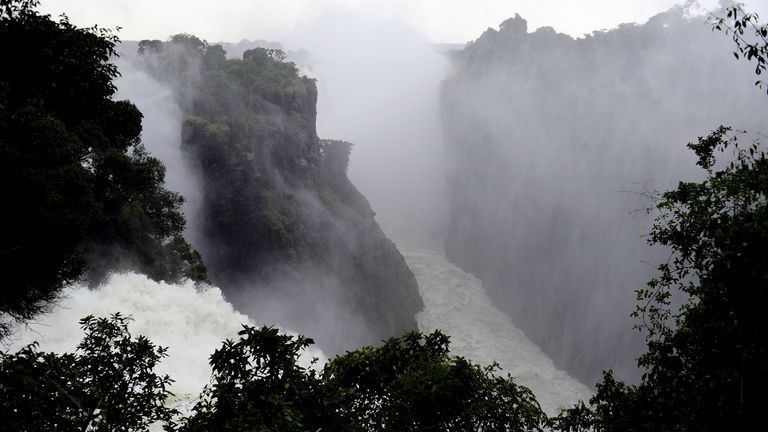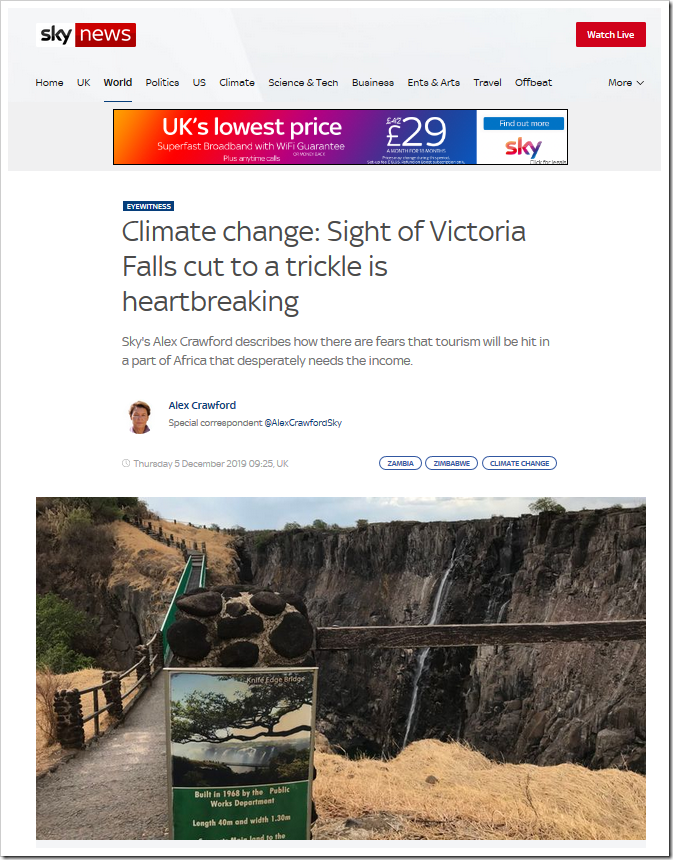Victoria Falls Drying Up? Sky Accused Of Fake News By Locals
By Paul Homewood
A few weeks ago, I mentioned a highly misleading BBC news item on Victoria Falls drying up. It appears that Sky have also jumped on the bandwagon:
It’s a heart-breaking sight in some places – and yet the magnificence of this geological natural wonder is no less awe-inspiring.
As a child I came here many times.
I was brought up in Kitwe in the Copper Mining Belt and I remember on holidays scampering over Knife Edge Bridge with my sister, feeling like I was running through a full-on shower and getting thoroughly soaked.

Image: Normally, the spray and mist are so strong it stops people being able to see along the gorge
The spray and mist was so strong we couldn’t see the end of the narrow 420 foot-long bridgeway.
The roar of the water storming over the edge was enormous. You had to shout to be heard.
It’s said, at its height, you could hear the sound of the falls from 12 kilometres away.
It’s not called Mosi-oa-Tunya (the Smoke that Thunders) for nothing.
But the crashing noise and wet all added to the excitement and adrenalin we felt as children, being in the shadow of one of the truly great natural wonders of the world.
We fell in love with it there and then. I returned with my own family many years later and my four children felt the same marvel looking at the world’s longest curtain of falling water and they too fell in love with the place.
So, I was shocked to my core seeing it so dry. And terribly sad too. Of course, there are seasonal periods where the falls have always dried up in sections.
But an extended drought in this region has meant a dramatic drop in water levels in the Zambezi River and today, right now, it seems a fraction of its magnificent self.
The huge chasm which divides Zambia and Zimbabwe is running to a trickle in places and water levels have dropped to their lowest in 25 years.
The falls are a source of national pride in Zambia and Zimbabwe – fiercely protected and defended.
And people in both countries are angry, and it has to be said, it seems to me a little frightened – not just at what many perceive to be the mismanagement of the drought emergency; the endemic corruption in both countries (which has meant less money used to combat the effects of climate change) but also at the international spotlight being thrown on the falls.
Tourism is already down 40% in Zambia.
They don’t want to dissuade any more tourists from avoiding the area.
"Look at the Grand Canyon," Rodney Sikumba, from the Livingstone Tourist Association told me. "That’s still a spectacular sight. So is our Victoria Falls. We want people to come. And there are so many other activities to do throughout Zambia too. We have the Big Five; we have bungee jumping; we have other waterfalls."
It’s true: there are many other places to visit and explore in Zambia.
But avoiding the Victoria Falls would be like going to Rome and avoiding the Colosseum, or travelling to Paris and not seeing the Eiffel Tower, or visiting China and by-passing the Great Wall.
You wouldn’t do it. And you shouldn’t do it.
Even now, at its lowest, it’s still an incredible visual feast, staggering in its size, magnificent in its natural energy and beauty.
It still has the power to take your breath away, even now at its weakest and most depleted in a quarter of a century.
The rains have been delayed and they are praying for several months of downpour in order to replenish stocks.
The Kariba Reservoir which straddles the Zambezi River and provides power to both countries is operating at only 11% capacity right now.
That’s meant a dramatic impact on almost everything that Zambia does.
Mining, agriculture and tourism: their top three money-generators have all been hit.
The rains will come, sooner or later, and by early next year, the falls will, nature dependant, be back to its former glory.
But the extreme and changing weather patterns around the world are having an impact – and developing countries like Zambia and Zimbabwe are at the "coalface" and feeling the effects most.
Sitting down in the State House in the Zambian capital, Lusaka, and talking to President Edgar Lungu, he made it clear, it’s less well-off countries like his own which are least able to afford its consequences.
The president stressed he felt it was incumbent on those countries generating much of the world’s pollution to accept some responsibility for its clean-up too – being felt most keenly by those countries with the least money.
But he accepted too that his own country and his own government had a duty to do more too.
"We haven’t done enough preparation as a country and we are paying the price for that," he told us.
Around two million people in Zambia are estimated to be hungry and needing food assistance because of the drought.
The president’s critics insist he’s using climate change to divert attention from his government’s failure to tackle the drought adequately; the misappropriation of public funds; the complaints about widespread corruption; and his desire to remain in power beyond the 2021 election.
Whatever the veracity of these arguments, there are many complex contributory factors which have led to the water crisis. Zambia’s unhealthy dependency on hydropower must surely be one of them.
The country’s near total dependence on hydropower (it provides 80% of the country’s electricity) means there is an undue strain on the ever-dwindling water supplies.
That affects electricity, businesses, mining, and every day surviving.
But temperatures are going up and water levels have been going down incrementally over the past few years and that means countries the world over would be wise to try to mitigate some of the climate change impact.
President Lungu told us: "Climate change is real. Its effects are slowly destroying mankind and we have to address it. Do we want to pass on the Zambezi without the mighty Victoria Falls? Do we want to do that? Is that what we want for future generations? There are practices and measures we can take now."
He is, of course, right.
The Victoria Falls are still one of the most beautiful sights you will ever be lucky enough to gaze on in your life.
It is truly bucket list material. And by trekking to Zambia or Zimbabwe to enjoy its splendour, tourists will be putting more money in the coffers so they can do more to save and protect this spectacular vision.
Given the chance, I’d still be going there every weekend to feast my eyes on it.
We can only hope the political leaders meeting in Madrid at the COP25 come up with a potent action plan for the future so these treasures are protected.
However this “heartbreaking” account has drawn a furious response from locals, who have accused the reporter, Alex Crawford, of “falsifying news” and “manipulating facts”.
One local, Peter Jones, has published this open letter on Facebook:
The full letter along with responses from fellow locals is utterly damning, and well worth a read here.
It is abundantly clear that Sky have their own agenda here, to push climate alarmism for all it is worth, and despatched Alex Crawford to create a fake news story.
The damage they have done to local tourism is unforgiveable.
Comments are closed.


That is a perfect example of what Rush Limbaugh refers to as “The Drive-by Media.” They stop, create some fantastic false story or destroy a person and then drive on down the road to the next. They never stay to pick up the pieces of the destruction they have created.
I’m sure the tourist trade along the GBR can sympathise with the people around the Victoria falls, having experienced similar falsehoods at the altar of climate change.
When Comcast took over SkyNews from Murdoch people thought it might change
… It did it is now even more metro-liberal bubbleworld
CommieCast some US tweeters call it.
Those Greenhedgefunds probably end up funding a lot of TV advertising.
Oh and everyone says “Sky News Australia”
often has a different culture
and since it is not lefty only ..there are some good bits.
Vic Falls is often dry a this time of year – this is the time not to visit. I first went there in 1984, around Easter, and thanks to a few years of drought, it was very dry. I went back in late August ten years later and it was full and magnificent. The idea that this is climate change is absurd.The water comes from rain in the highlands hundreds of miles away.
Reblogged this on Climate- Science.press.
I have a friend who has been out there for a year. The Longer letter backs up what she has been saying all year – i.e the water flow is seasonal ( who would have guessed) , some is now diverted for hydro ( which reduces flow over the falls who would have guessed) they get a dry ish year very couple of years ( documented) and my friend even met him at the airport when she got wind of the story ,and he promised to contact her for a different perspective. Still waiting
Here are some flow data: http://www.zambezira.org/hydrology/river-flows
It was dry last water year, but not as dry as 25 years ago. –AGF
The BBC have been trying to create an unprecedented drought narrative for Zambia recently.
“Temperatures in parts of Southern Africa are expected to rise by twice the global average as a result of climate change.”
Another one for the ‘everywhere warming twice as fast as everywhere else’ list!
https://www.bbc.co.uk/news/video_and_audio/headlines/50976829/climate-change-has-brought-parts-of-zambia-to-the-brink-of-famine
Seems odd as earlier in the year it was ‘climate change’ floods – still it’s a big country.
http://floodlist.com/africa/deadly-storms-floods-malawi-zambia-mozambique-january-2019
http://floodlist.com/africa/zambia-floods-eastern-province-january-2020
Send SKY an Invoice for loss of Trade & income, that will be an attention getter
I lost the plot when told what to see — – the Colosseum, the Eiffel Tower, China’s Great Wall – – none of which I care to see. The countries are too interesting to waste time viewing things that are well pictured on the web.
In fact, I would love to see these Falls while short of water. One can see the stratigraphy (rock structure). I’ve seen the U. S. side of Niagara Falls about 99% dry.
Further regarding Italy (one example):
https://www.wanderingitaly.com/places/carrara-marble-tour.html
Does anyone keep track of those stories? Because it will be important when the bubble pops and people cannot take the financial pressure this scam places upon us anymore. There are so many falsified stories now, it has become a deluge.
I complained to the BBC about this news report and have had a reply saying that as they are late with their answer I can go to the Ombudsman but they will reply as soon as they can. I will await their reply with interest!
It is because we humans are superstitious that activists can use our inborn confirmation bias to peddle this kind of misinformation.
https://tambonthongchai.com/2018/08/03/confirmationbias/
Please can you make your articles clearer! Is it dried up or not? Quoting the Sky report at length without giving much clue as to where or whether it is not factual makes it difficult to make sense of your point.
This was dealt with in an earlier post:
The full letter on Facebook, which I did not publish in full because of its length, but which I did link to, also explains the actual situation:
OK, thanks.